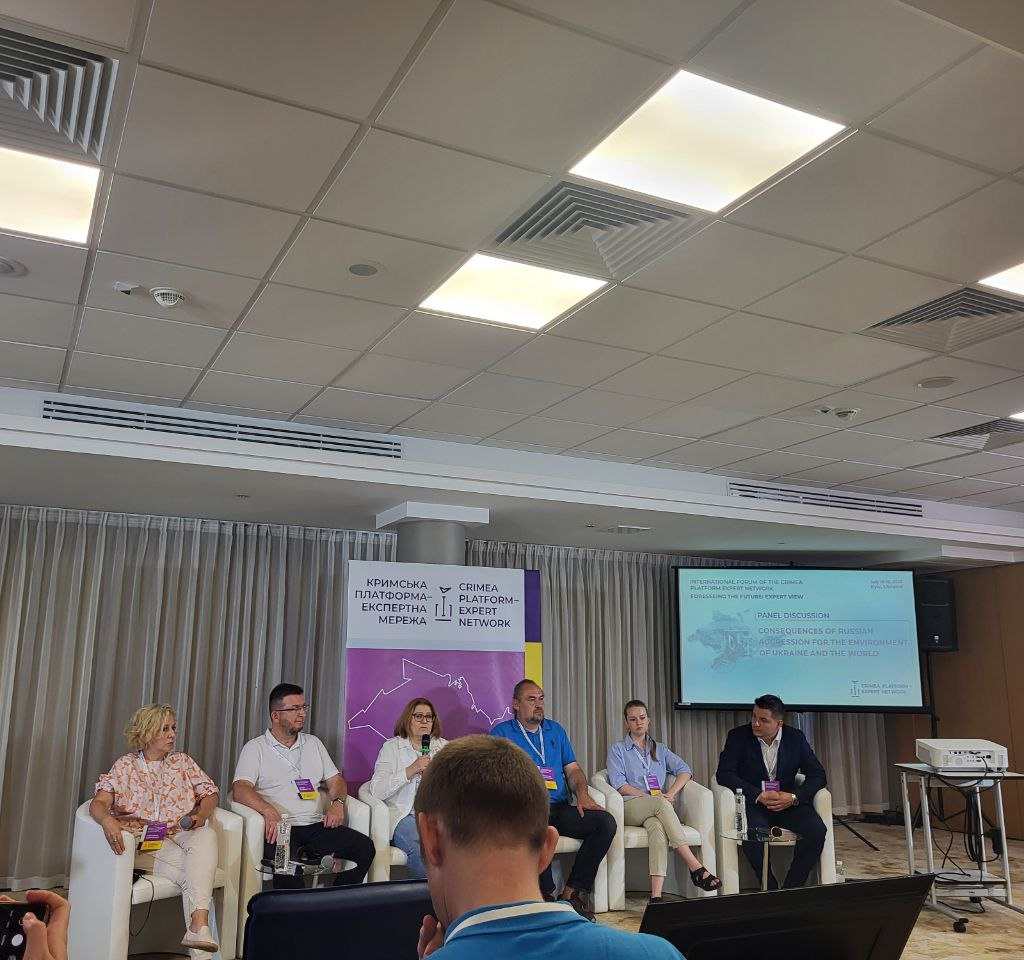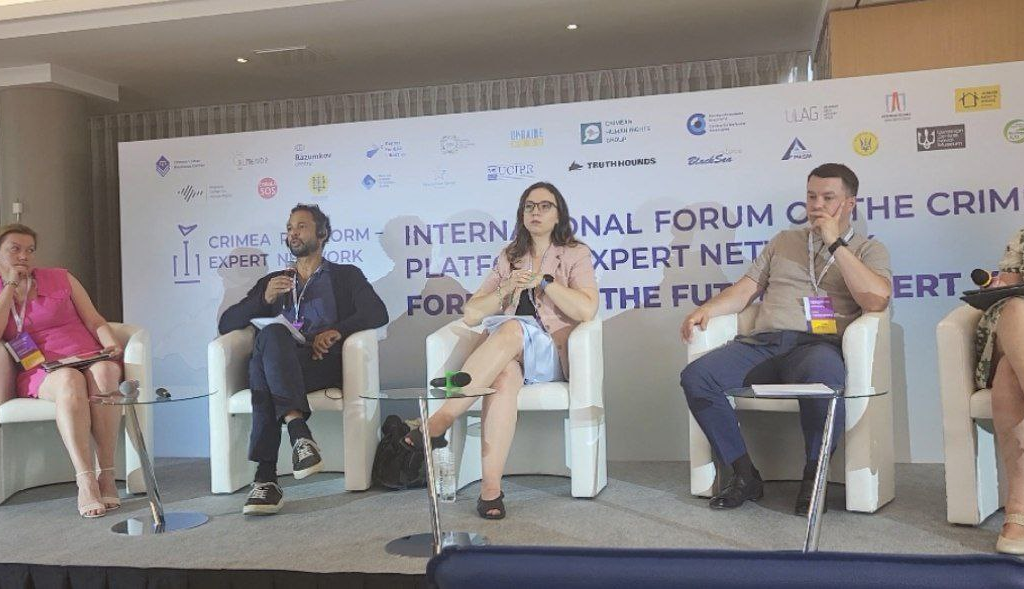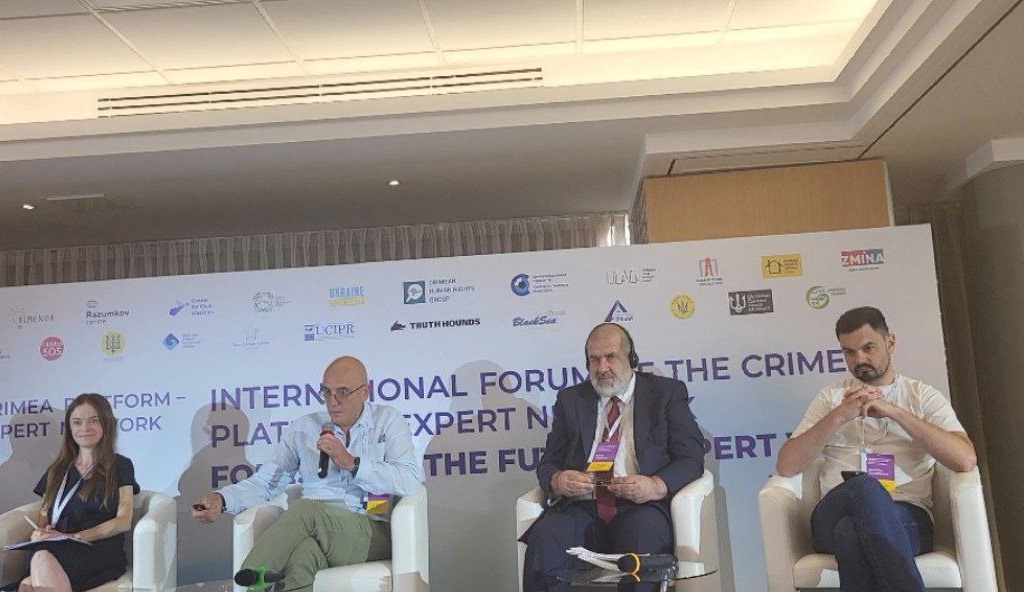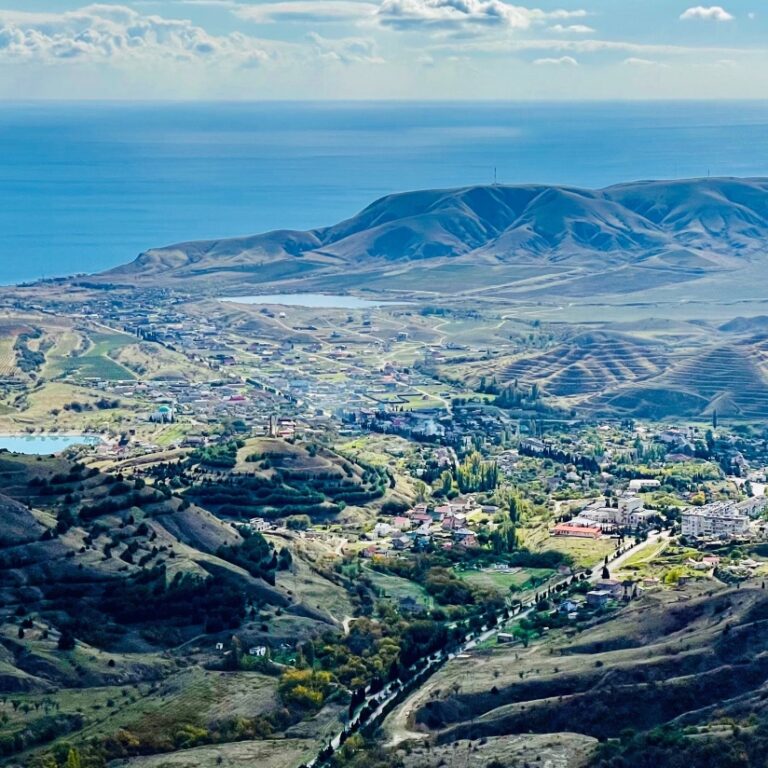On July 18-19, Kyiv hosted the International Forum of the Crimean Platform Expert Network “Vision of the Future: Expert View”. Over the course of two days, Ukrainian and international politicians and experts discussed the future security architecture of the Black Sea region and the entire world, and considered the environmental threats to Ukraine and the world caused by Russian aggression and occupation. The participants conducted an in-depth analysis of Ukraine’s future steps towards bringing the aggressor to justice for all crimes committed. In addition, recommendations were developed on practical steps aimed at strengthening security in Ukraine and in the world.
ARC correspondents were able to attend the event and asked several questions to the forum participants.

During the discussion of the environmental consequences of the war unleashed by Russia, Association’s representative asked the senior legal advisor of Truth Hounds: “What international institutions do experts cooperate with to develop mechanisms of aggressor liability for ecocide?”
He answered: “It should be noted that a separate crime of ecocide in the international sense has not yet been formulated, although there are already certain proposals, in particular, this case will be a strong enough impetus for ecocide to be formulated separately. That is, at the moment we only have the wording we were talking about, the Rome Statute, Article 8, paragraph 4, which defines that such attacks cause harm. As for international cooperation, first of all, it is the International Criminal Court, which… conducts the investigation. In parallel, the second option, which I did not have time to talk about in more detail, is the use of universal jurisdiction mechanisms, when countries have appropriate criminal penalties for such actions. And if their procedural legislation allows them to investigate the most serious crimes such as this, they can open and investigate cases directly in their countries, either by agreement with Ukraine or at the request of, for example, civil society organizations. And there are already successful cases where such mechanisms have been used. But at the moment, we see that one of the most promising options for this investigation is an investigation within the framework of the International Criminal Court, especially since we see that the Prosecutor General’s Office already has cooperation with them and a certain understanding of how to investigate this crime.”
Our correspondent also asked Yevhen Khlobystyi, Doctor of Economics, Professor at the National University of Kyiv-Mohyla Academy: “What methods of calculating the damage caused by the aggressor do experts consider the most appropriate to apply to the occupied Crimea?”
He noted: “Since the beginning of the full-scale invasion, at the request of the State Environmental Inspectorate, we have started working on updating approaches to determining the damage caused by the cost measurement of environmental damage measures. Today, these projects and methodologies can be found on the website of the Ministry of Environment and the State Environmental Inspectorate. We have developed such approaches for atmospheric air, are in the process of developing the same for soil, and have already developed approaches for water resources. In other words, we are currently working to reformulate our approaches to assessing the damage caused, taking everything into account. This is a unique situation; we are not dealing with an accident that occurred as a result of some events, negligence or something else. This is the deliberate destruction of environmental elements… Long-term damage to natural resources, to humans and to unique objects, including ecosystems… So, this work is still ongoing, and we are working on it. Plus, we have an ambitious idea that these approaches should be adjusted according to the common European practice, the common European tradition, because our ultimate goal is to bring Russia (to justice for ecocide – ed. )…International courts will either develop a tribunal for Russia as a separate court or some other currently existing legal one…But we have to prepare our vision in the context of today’s European tradition…And, by the way, this was a very good reason for us to move away from a certain past heritage, methodological, because over the past 30 years we have had to, as they say, “improve the existing approaches.” Today we need to remake it.”
Another ARC correspondent asked Yevhen Khlobysty: “How do you view the issue of another blackmail by Russia regarding a possible provocation at the ZNPP and the aggressor’s readiness to use nuclear weapons? What are the consequences of such crimes for the ecosystem of Ukraine, in particular Crimea?”
He answered: “First, an accident at the Zaporizhzhya nuclear power plant, which could be provoked by the Russian Federation, is possible. We have been discussing it quite actively over the past few months. It is very, very unlikely that they will be able to create a real nuclear disaster of the level of Chornobyl or another level. This is influenced by the peculiarity of the functioning and construction of reactors. I would like to remind everyone present that when the Zaporizhzhia NPP was built, it had to withstand a direct hit from a nuclear bomb to ensure that the reactors survived. That is, it is not very possible to blow up the reactors today with conventional weapons and the forces that are near the power plant today. Yes, it is possible to damage them. It is possible that they could try to blow up the cooling system, that is, to provoke a so-called thermal explosion due to overheating of a certain part of the reactor elements of the plant, such a thermal explosion could cause a small release of pollutants, the circle of impact would be about 2.5 km from the point of explosion, it would not lead to a global nuclear disaster. The only people who will be affected by this explosion are the plant personnel, and the residents of Enerhodar may feel the effects. We are not counting on anything else for now, purely for such engineering and technical reasons. Of course, some extreme forms of destruction of the plant are possible, purely in this, you know, in a fantastic version, a direct hit by a strategic nuclear missile. Of course, this would change the situation radically.”
The ARC representative also asked: “How is the fake public tribunal and the processes of ecocide inspired by the aggressor considered, and are there regulatory mechanisms for bringing to justice pseudo-experts, especially foreign ones, involved in such propaganda processes?”
Mykola Yurlov provided the answer: “It is clear that this has no legitimacy and no legal consequences. As for the specific responsibility of those who participated in such events, it depends on the degree of their involvement. Everything will be decided on a case-by-case basis.”
During the first day of the forum, participants discussed environmental issues caused by Russian aggression. Sofia Sadogurska, expert of the NGO “Ecodiya”, researcher at the M.G. Kholodny Institute of Botany of the National Academy of Sciences of Ukraine, said: “The Russian occupiers conducted illegal sand mining on the Bakal Spit, which is located in the northwest of the Crimean Peninsula. The spit was partially damaged and now it is an island…” She also emphasized that Russia continues to use the occupied Crimea as a military base: “Mine clearance, underwater explosions, destruction of port infrastructure, invasive species is not a complete list of negative impacts on the environment. These are all factors of marine pollution.”
The second day was opened by First Deputy Minister of Foreign Affairs of Ukraine Emine Dzhaparova, who emphasized that the Crimean Platform is an unprecedented event that currently unites 60 countries and international organizations with one strategic goal: the de-occupation of Crimea: “Our goal is to form a clear understanding among our partners that there can be no negotiations without Crimea. There can be no peace in Ukraine without Crimea. There are various proposals. But the position of the state and the President is clear – there can be no negotiations and agreements without Crimea.”
The Permanent Representative of the President of Ukraine in the AR of Crimea Tamila Tasheva said that the de-occupation of Crimea will primarily take place not only in the political and diplomatic dimension, but also militarily. And no matter how it happens, a clear plan to regain control over the peninsula and the first steps of the state after the liberation of Crimea should be ready: “We do not know how it will happen (de-occupation – ed.). Perhaps the Russian army will leave a lot of destruction behind. But we understand that we need all the plans for reintegration, first of all, to regain control over Crimea.”
She also reminded that an experimental project, the Crimean Restoration Reserve, was launched at the initiative of the Mission of the President of Ukraine in the Autonomous Republic of Crimea and in cooperation with ministries and agencies: “I urge those citizens who are ready to travel to the territory of Crimea to submit their candidacies to this personnel reserve. It is important for us to create a “Crimean team” that will work on the peninsula after de-occupation. We already have about a thousand applications. 80% of them are from Crimea. This means that everyone believes in the inevitability of de-occupation.”
Andriy Klymenko, Head of the Monitoring Group at the Black Sea Institute for Strategic Studies, noted the main threat to the Black Sea region: “Russia’s economy has withstood, adapted and reoriented to the global east. The Black Sea is becoming a source of income for Russia to continue the war. Since March 2023 alone, Russia has been receiving 5 million tons of crude oil and 4.5 million tons of diesel fuel from Black Sea ports every month. Oil exports are only growing.” He added that in the seventh month of the embargo on Russian oil, the number of embargo violations is increasing. Several dozen tankers a month make direct trips to ports in the United States, Belgium, Spain, Greece and other countries: “Even partial economic isolation of such a large country as Russia seems impossible. A fifth of the global economy will come to a standstill.” To solve this problem, according to the expert, it is necessary to create a special body within the EU that will monitor compliance with the sanction’s regime against Russia. Klymenko also noted: “In the security sense, Ukraine, including the Black Sea, has already become and will remain a frontline state in the foreseeable future until we join NATO. A vast territory of constant, long-term confrontation between Western civilization and Russian barbarism. The future of Ukraine is a warrior state.”
Ihor Ponochovnyi, Head of the Prosecutor’s Office of the Autonomous Republic of Crimea and the city of Sevastopol, emphasized: “Ukraine has the first court verdicts in absentia in the cases of Russian military commissars who force Crimeans to serve in the Russian army and against judges who made decisions to deport Ukrainians from Crimea. These are crimes that have no analogues in Ukrainian criminal law.”
During the second day of the forum, our representative asked the experts: “To what extent is it possible to bring the self-proclaimed president of Belarus to justice for supporting military aggression against Ukraine, providing the country’s territory for attacks on Ukraine, and for facilitating the illegal deportation of children who are being taken from the occupied parts of Ukraine, including through Crimea?”
Alina Pavlyuk, attorney at law at Ukrainian Legal Advisory Group, commented: “Here we can refer to the mandate of the International Criminal Court. If we are looking at the crime of aggression committed against Ukraine, then obviously not, purely because the ICC has no mandate. If we are talking about the qualification of war crimes or crimes against humanity, or the alleged crime of genocide, if its involvement is established, then I think we can potentially expect such decisions… The positions of the Office of the Prosecutor of the International Criminal Court will still be based on evidence, on investigations and on specific facts.”

Wayne Jordash, Managing Partner at Global Rights Compliance LLP, noted that: “The International Criminal Court is taking an insufficient approach to investigating war crimes. Since Russia’s full-scale invasion, the volume of crimes has indeed increased. But experts did not see an emphasis on investigating crimes until 2022. This somewhat de-prioritizes the crimes committed by the occupier since 2014.” The expert emphasized that: “It is from the experience of the occupied Crimea that we will see that the international community should not remove from the agenda the crimes committed by Russia on the territory of Ukraine until February 2022. This is not an object of bargaining”.
Evelina Kravchenko, a leading researcher at the Institute of Archeology of the National Academy of Sciences of Ukraine, noted that Ukraine is the heir to the culture of the peoples who lived in the northern Black Sea region and Crimea. Despite Russia’s attempts to steal this culture, it is Ukrainian artists who should represent it in the world. She also emphasized that when it comes to the cultural heritage of Crimea, it cannot be separated from the rest of Ukraine’s culture: “It all started with the theft of culture. Cultural heritage cannot change. For centuries, Russia has been defining the northern Black Sea region as its own territory and presenting it to Europe and the world as if it were their culture. Ukrainian artists are newcomers to these markets. We are only now being recognized and listened to there.”
Eskender Bariiev, Chairman of the Board of the Crimean Tatar Resource Center, said in his speech that: “According to the Crimean Tatar Resource Center, the occupation authorities in Crimea have detained and are prosecuting 294 citizens, 196 of whom are representatives of the Crimean Tatar people. 175 people are currently imprisoned, 117 of them are representatives of the Crimean Tatar people. This proves once again that since 2014, the Crimean Tatars have clearly stated their position.”

The Chairman of the Mejlis of the Crimean Tatar people, Refat Chubarov, stated in the context of Russia’s constant threats to Crimea: “In my opinion, the end of the Russian-Crimean war should be formalized, enshrined by the international community in the form of very clear agreements, enshrined in the decisions of leading international organizations.”







